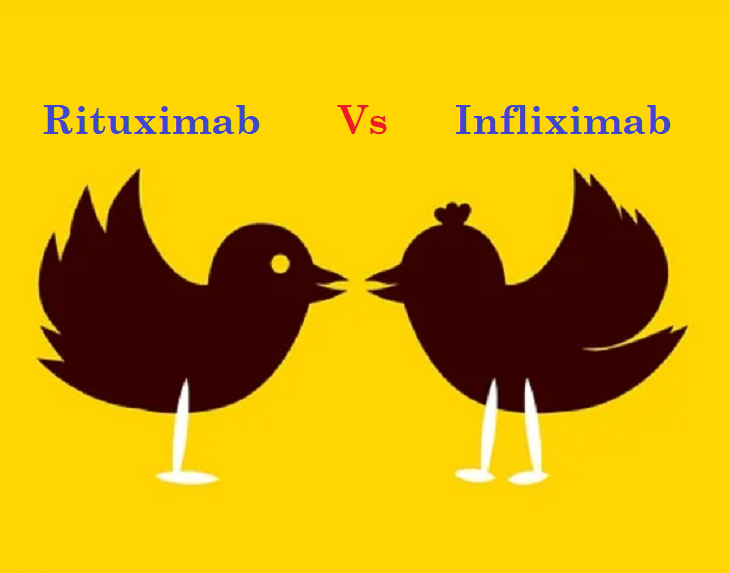Rituximab Vs Infliximab is a comparison of the two drugs. Rituximab is a monoclonal antibody that targets CD-20 Positive B Lymphocytes While Infliximab is a TNF Inhibitor.
Drug Description: Rituximab Vs Infliximab:
Rituximab | Infliximab | |
| Class | Monoclonal type I CD20 antibody |
|
| Trade Names |
|
|
| Formula | C6416H9874N1688O1987S44 | C6428H9912N1694O1987S46 |
| Molar mass | 143860.04 g·mol−1 | 144190.64 g·mol−1 |
Mechanism of Action of Rituximab Vs Infliximab:
Rituximab | Infliximab |
| Rituximab is a monoclonal antibody against the CD20 antigen on the B cell’s surface. It induces complement-mediated cytotoxicity and antibody-dependent cell-mediated cytotoxicity after binding to the CD 20 surface antigen. It invokes structural changes, apoptosis, and sensitization of cancer cells to chemotherapy. | Infliximab is an IgG1κ monoclonal antibody that binds to the transmembrane forms of TNF-α thus disrupting the pro-inflammatory cascade signaling. It results in the reduction of pro-inflammatory cytokines such as IL-1, IL-6, lymphocytes, endothelial adhesion molecules, and acute-phase proteins. Infliximab inhibits TNF-α in endothelial cells, human fibroblasts, neutrophils, and B and T lymphocytes. |
Rituximab Vs Infliximab: Pharmacokinetics, Dose, and Indications:
Rituximab | Infliximab | |
| Distribution |
|
|
| Half-life elimination | 5 – 78 days | 7.7-9.5 days |
| Administration and Dosage |
|
|
| Indications |
|
|
| Use in Pregnancy |
|
|
Common Side effects: Rituximab Vs Infliximab:
Rituximab | Infliximab | |
| Side effects |
|
|
Contraindications and Warnings: Rituximab Vs Infliximab:
Rituximab:
It should be used with caution in the following conditions:
- Bowel obstruction or perforation
- Ventricular fibrillation
- Myocardial infarction
- Cardiogenic shock.
- Patients should be screened for Hepatitis B prior to therapy. Screening should include HBsAg (hepatitis B surface antigen) and Hepatitis B core antibody (anti-HBc). All patients who develop viral hepatitis should be treated with appropriate antiviral therapy.
Infliximab:
- If the patient is older than 65 years, there is an increased risk of developing infections or sepsis
- The patients who were treated with this drug in childhood or adolescence reported to have developed lymphomas or other malignancies at later age.
- There is an increased risk of infections caused by opportunistic pathogens such as Legionella, Listeria, Mycobacterium tuberculosis), and hepatitis B virus in the subject taking infliximab.
Rituximab Vs Infliximab in Remission of refractory hepatitis C:
- The patients with HCV with severe multisystem disease showed partial disease control with Rituximab
- But with subsequent Infliximab therapy showed full remission in patients with refractory Hepatitis C
- HCV positive patients with renal involvement who responded to the Rituximab therapy showed a better clinical response. And such cases were reported when the patient became normotensive with the return of normal renal function.
- Infliximab is effective in controlling Gastrointestinal Vasculitis. And such patients had decreased risk of GIT bleeding as compared to the patients taking Rituximab
- However, Rituximab is more effective in controlling the cutaneous and renal manifestations in patients with chronic Hepatitis C.
Infliximab better controls GI Vasculitis While Rituximab controls Renal and Cutaneous Vasculitis well
Rituximab Vs Infliximab role in Rheumatoid Arthritis:
- Rheumatoid Arthritis is a chronic multi-system autoimmune disease of unknown etiology. It mainly affects the synovial joints which eventually causes the cartilaginous and bony elements destruction resulting in chronic pain and disability
- A RCT was conducted to see the efficacy of Rituximab and Infliximab in patients showing no clinical improvements with DMARDS i.e. methotrexate
- In rheumatoid arthritis, RCTs suggested that Rituximab provides more adequate control of disease than DMARDs such as methotrexate.
- The patients who showed inadequate response with the Rituximab showed better response with the infliximab-based therapy.
- However, the main drawback of infliximab is its cost-effectiveness and magnitude of side effects.
- The patients taking rituximab showed a lack of compliance because of its intolerance and ineffectiveness.
Rituximab is well tolerated and has better compliance than infliximab, however, Infliximab is better at controlling the disease
Rituximab Vs Infliximab role in Refractory Wegner’s Granulomatosis:
- Wegener’s Granulomatosis is ANCA-associated vasculitis with systemic involvement.
- The patients taking Rituximab showed a better response, maintaining remission and compliance with this drug.
- In terms of Wegner’s Granulomatosis severity before the start of treatment, the drug tolerance is similar in patients taking Rituximab and Infliximab.
- The infliximab-taking patient showed a greater relapse and death rate than the group taking Rituximab.
- In conclusion, Rituximab showed superior results in patients having refractory Wegener’s Granulomatosis.
Rituximab is Superior to infliximab in GPA
Rituximab Vs Infliximab role in Crohn’s Disease:
- In patients with active Crohn’s disease, who were found to be resistant to standard therapy showed induction and maintenance of remission with Infliximab.
- However, there is an increased risk of loss of efficacy, infusion allergic reaction, and infections due to the development of antibodies against this drug.
- Rituximab administration in Crohn’s Disease led to a drastic decrease in B cells and it was well tolerated by patients. But it failed to induce long-term remission in moderately active UC.
In IBDs, Infliximab is superior to Rituximab
Conclusion:
The Randomized controlled trials have evaluated the efficacy of the two drugs used in different autoimmune diseases. Infliximab has shown far more superior results in patients with Crohn’s disease than Rituximab in inducing and maintaining remission. However, in vasculitis and Rheumatoid arthritis, Rituximab is superior and has better compliance than Infliximab.
More studies need to be conducted to make either of the drugs standard therapy in different diseases.
Read: Rituximab VS Obinutuzumab (Rituxan Vs Gazyva) Comparison
